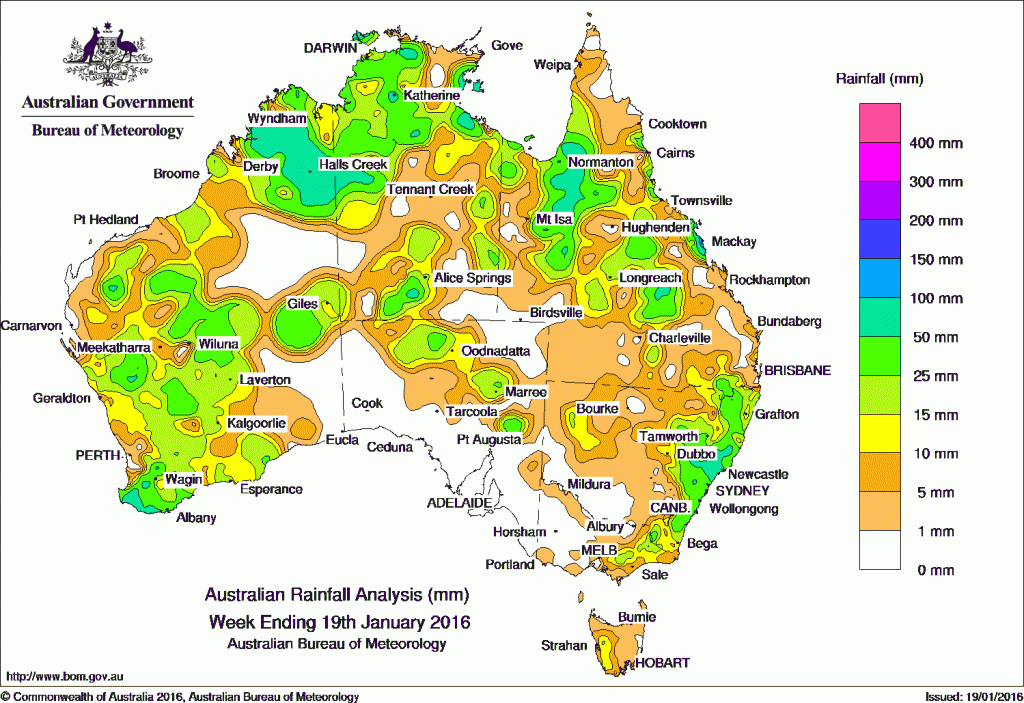Rain was recorded in all states and territories in the past week, with the heaviest falls received in Western Australia’s southwest and the Kimberley, in the north and south of the Northern Territory, the Gulf Country, Central East Coast and Central Highlands districts in Queensland, and between the Mid North Coast and Illawarra districts in New South Wales.
At the beginning of the week, a complex surface- to mid-level trough extended from northern Western Australia through central parts of the continent to New South Wales, and a cold front was located in western Victoria. An extensive cloudband with embedded thunderstorms developed over central and southeastern Australia. Moderate falls were recorded in the Kimberley, Top End, southern parts of the Northern Territory and down into bordering parts of northern South Australia.
In the middle of the week, the cold front and associated cloudband traversed across southeastern Australia, with a weak low developing on the north coast of New South Wales. The systems generated moderate falls in western Tasmania, eastern Victoria and parts of central and eastern New South Wales, with heavier falls recorded in the Hunter and Manning districts. A trough over inland Queensland and a ridge over the eastern seaboard in the wake of the cold front produced moderate to heavy falls in the central and tropical east coast of Queensland.
At the end of the week, a complex area of low pressure developed over southwest and central Western Australia. The systems were slow-moving and generated an extensive area of middle- and upper-level cloud with embedded thunderstorms over the South West Land Division and central districts of Western Australia. A broad trough over northern Australia brought moderate falls to the Kimberley, Gulf Country and western Cape York Peninsula.
Rainfall totals exceeding 100 mm were recorded in Manning and Hunter districts in New South Wales, the Darwin-Daly district in the Northern Territory, the East Kimberley in Western Australia, and a pocket of the East Central Coast district in Queensland. The highest weekly total was 190 mm at Yarras in the Manning district in New South Wales.
Rainfall totals between 50 mm and 100 mm were recorded in southwest and the Kimberley in Western Australia, in the north and south of the Northern Territory, the Gulf Country, Central East Coast and Central Highlands districts in Queensland, and between the Mid North Coast and Illawarra districts in New South Wales.
Rainfall totals between 10 mm and 50 mm were recorded in most of the western half, the far north and parts of the central interior in Western Australia, in the north, east and southern parts of the Northern Territory, and in northern and eastern parts of South Australia. Similar totals were recorded in eastern Victoria, western Tasmania, in central and eastern New South Wales and across large parts of Queensland.
Little or no rainfall was recorded in the south coast and northeast of South Australia, the western half of Victoria, eastern Tasmania, southwest and northwest New South Wales, and southwest, parts of the southeast coast and the eastern Cape York Peninsula during the week.
Highest weekly totals in each State and Territory:
New South Wales and Australian Capital Territory
190 mm Yarras (Mount Seaview)
128 mm Mount George (Manning River)
108 mm Careys Peak (Barrington Tops)
Victoria
28 mm Mount Baw Baw
26 mm Omeo
25 mm Walhalla, Mount Tamboritha
Queensland
154 mm Mackay M.O
150 mm Farleigh Co-Op Sugar Mill
145 mm Mackay Aero
Western Australia
104 mm Mount Amhurst
97 mm Halls Creek Airport
95 mm Nannup
South Australia
25 mm Todmorden
21 mm Wilpena (Oraparinna)
20 mm Oodnadatta Airport
Tasmania
17 mm Mount Read
16 mm Tim Shea (Summit)
14 mm Kunanyi, Butlers Gorge
Northern Territory
159 mm Katherine Country Club
115 mm Katherine Council
112 mm Lajamanu Airport
More weekly rainfall totals:
- NSW/ACT totals click here
- Vic totals click here
- Qld totals click here
- WA totals click here
- SA totals click here
- Tas totals click here
- NT totals click here
Source: BOM


HAVE YOUR SAY